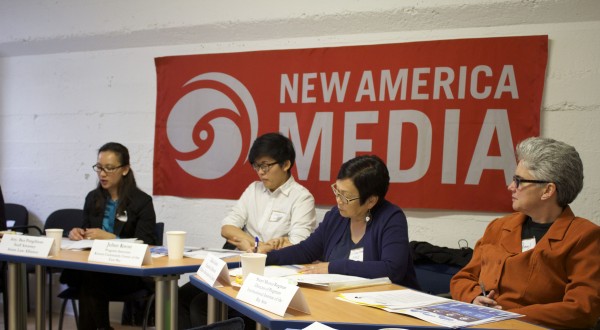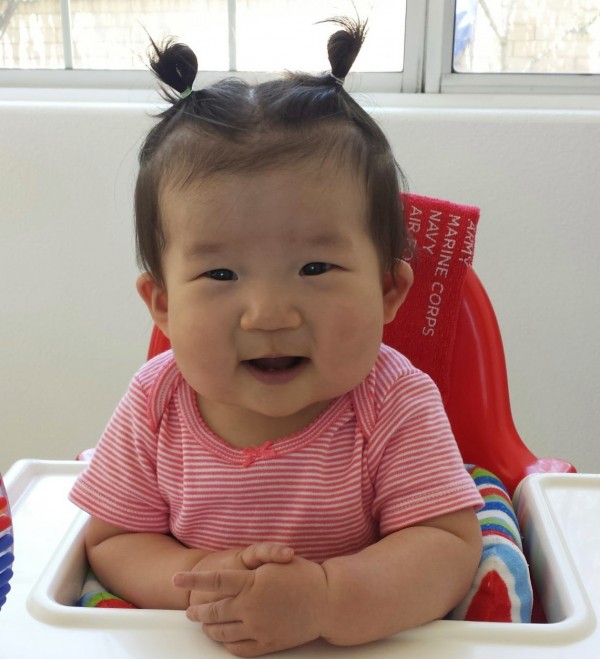Pictured above: Attorney Bea Pangilinan, Juhee Kwon, Lilian Galedo, and Sheryl Munoz-Bergman (from left to right) spoke to journalists and activists as panelists for Friday’s roundtable discussion. (Photo courtesy of Seung Y. Lee)
by SEUNG Y. LEE
More than 30 lawyers, journalists, and citizen activists gathered for a roundtable talk Friday at New America Media’s San Francisco office to discuss the low application rate among Korean and Filipino American communities for consideration under Deferred Action for Childhood Arrivals, commonly known as DACA.
Since 2012, more than 550,000 undocumented immigrants have received DACA’s benefits and protection—including 68 percent of eligible immigrants from Mexico—but only a small number of eligible Asian Americans have applied for the program, according to New America Media (NAM), a coalition of ethnic media which hosted Friday’s roundtable.
According to the multiethnic news agency, only 24 percent of eligible Korean immigrants and 26 percent of eligible Filipino immigrants across the United States have applied for DACA since it began.
“When I heard [these numbers], my first impression was that this study was wrong,” said Sandy Close, executive director of NAM and host of the discussion. “What can we, as the media, do to break the sound barrier?”
DACA was implemented in June 2012 by the Obama administration to allow certain undocumented immigrants—those who came to the United States before they turned 16, and were under age 31 as of June 15, 2012— to receive protection from removal action up to a period of two years, and also receive work authorization.
In November, the program was expanded to include immigrants who entered the country before 2010 (from the previous 2007), while it eliminated the age cap for eligible applicants and lengthened the renewable deferral period to three years, from two. (A Feb. 16 federal court order, however, has temporarily put that expansion on hold.)
In attendance Friday were representatives from various legal and community organizations within the Korean American and Filipino American communities, along with three DACA recipients—two of whom are Koreans—who shared how DACA changed their lives for the better.
 Miguel Sales, Bill Song, and Ju Hong, three DACA recipients, share their life stories before and after applying for DACA. (Photo courtesy of Seung Y. Lee)
Miguel Sales, Bill Song, and Ju Hong, three DACA recipients, share their life stories before and after applying for DACA. (Photo courtesy of Seung Y. Lee)
One of those speakers was Bill Song. He shared his story of learning how he could not apply to the colleges he dreamt of attending after finding out during his senior year of high school that he was an undocumented immigrant. His family hid the fact out of shame, he said—a theme that repeatedly arose during the discussion, especially among the Korean Americans—and expressed skepticism when Song told them he planned to apply for DACA.
“‘Just stay low from the government’ was the overall stance from the community,” Song said. “I’m safe now, but that’s just how the Korean American community feels still.”
Ju Hong, a UC Berkeley alumnus who made national news when he interrupted President Obama’s speech at an immigration rally in San Francisco in 2013, spoke about how he was able to visit South Korea for the first time in 13 years thanks to DACA. Hong now works as an outreach coordinator for the National AAPI DACA Collaborative where he helps eligible Asian Americans apply for DACA.
Discussion also turned to the Feb. 16 order by a federal judge in Texas which blocked an expansion of DACA, including an initiative known as Deferred Action for Parents of Americans and Lawful Permanent Residents, or DAPA, which would extend the program’s benefits to undocumented immigrant parents.
Lawyers in attendance Friday repeatedly noted that the injunction does not mean DACA is being shut down.
“We consider this a temporary setback,” Asian Law Alliance attorney Bea Pangilinan said. “We’re confident the courts will push through.”
The lawyers also warned possible applicants to watch out for unauthorized practitioners looking to take financial advantage of interested applicants by asking for a lawyer’s retainer fee. Several immigrant organizations, such as the Korean Community Center of the East Bay (KCEEB), provide consultation for DACA applications for free, the panelists noted.
Yet, as the personal stories on Friday reflected, for many eligible Korean American or Filipino Americans who choose not to apply for DACA, financial constraints aren’t always their biggest worry. Social pressure to fit into the “model immigrant” mold and a relatively weak political activism and partnership with the government perpetuate a culture of silence among Asian American communities, said Juhee Kwon, a program associate at the Oakland-based KCCEB.
Kwon said that many Korean Americans tend to associate undocumented immigrants as persons primarily from Latin America, and stigmatize fellow Koreans who may face the same predicament. Additionally, some of the major social hubs for immigrants—particularly churches and religious groups—foster a feeling of shame for undocumented immigrants, she said.
“A lot of rhetoric in the Korean American society on the issue is one of a culture of shame and silence,” Kwon said. “Asian communities try to distance themselves from the Latino immigrant communities, and it isolates the undocumented inside their own.”
Although there are well over 8,000 undocumented Korean immigrants living in the Bay Area, according to a 2013 survey by the University of Southern California, Kwon said she has met church leaders who claim there are no undocumented immigrants in their churches.
The lack of vocal support within their communities has amplified fear for many undocumented Asian Americans and largely prevented them from seeking relief under DACA or other forms of government amnesty that can improve their livelihoods in the U.S., the panelists said.
“We in the Asian American community have not been vocal about undocumented people,” said Lilian Galedo, executive director for the Oakland-based Filipino Advocates for Justice. “They think Asian American communities won’t have their backs.”
Also touched on in Friday’s panel were suggestions on how Asian American media can expand its coverage of DACA. Activists and lawyers on Friday recommended that media mention legal resources in articles and write in Korean and Tagalog, as well as in English, to reach larger audiences.
___







